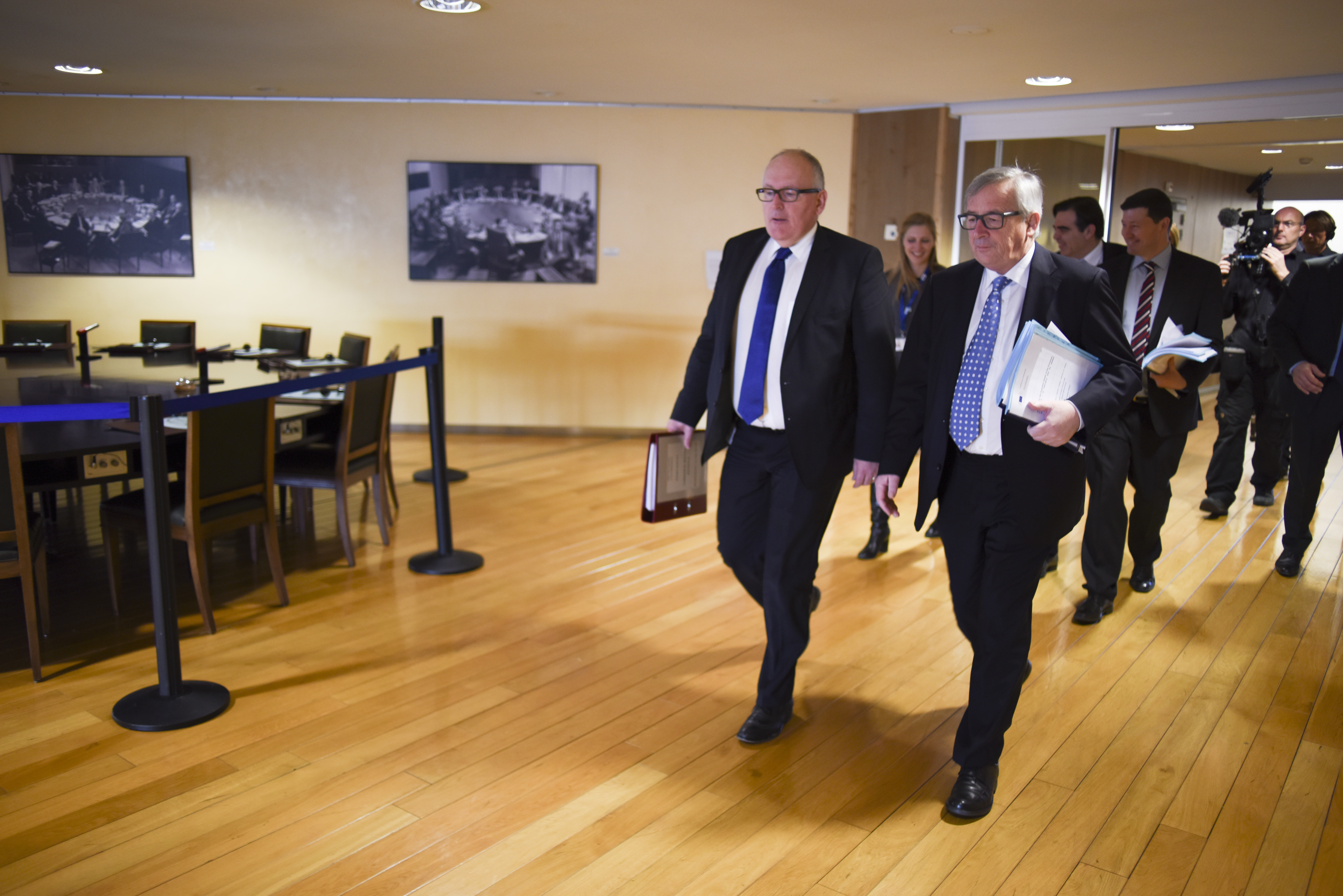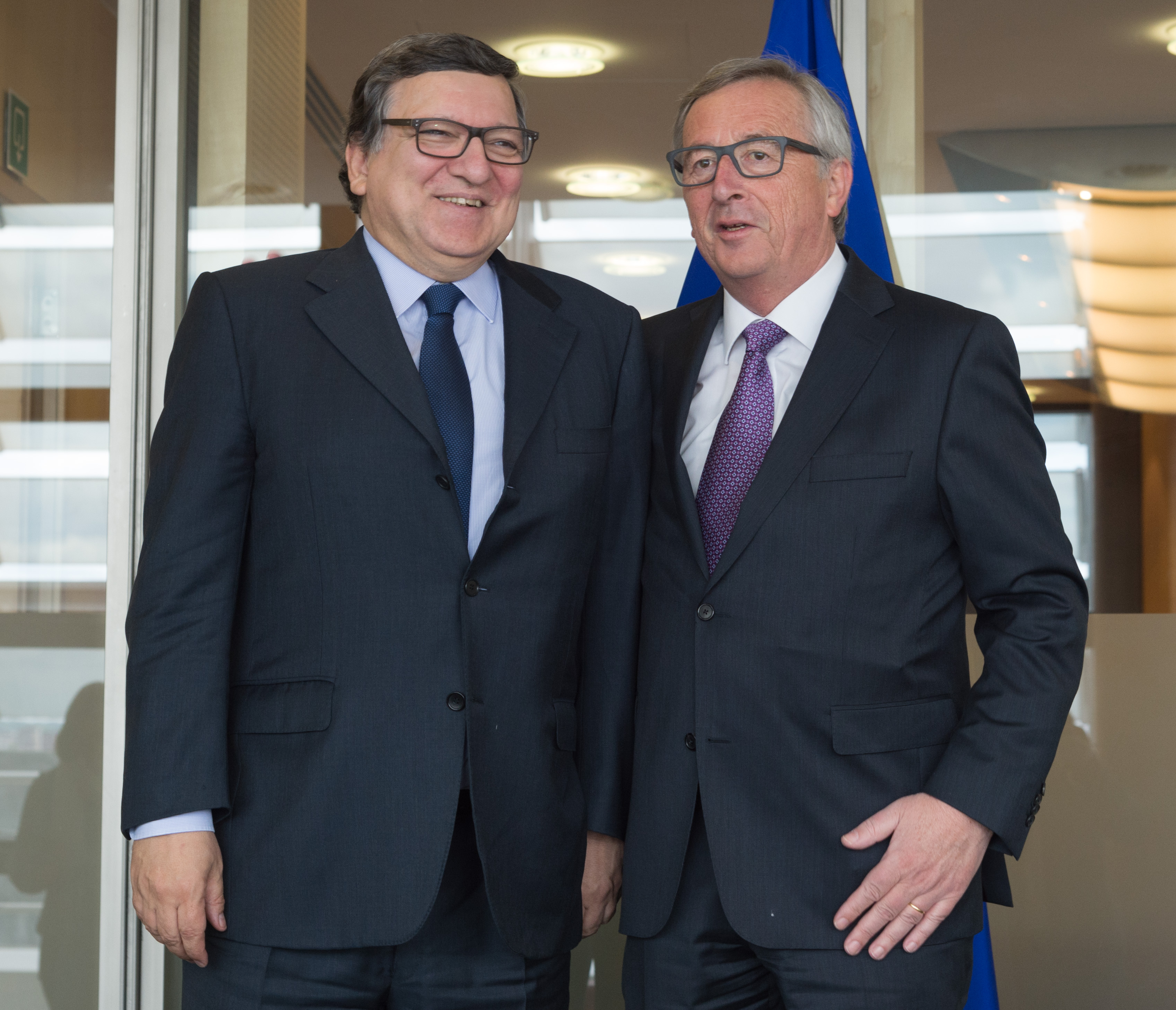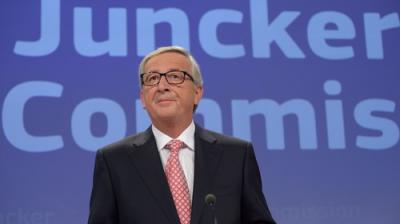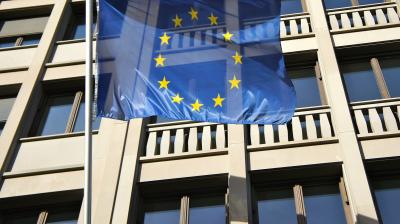EU Forum
Juncker's weakness? His lack of vision for the future of the EU

On assuming office, EU Commission President Jean-Claude Juncker presented his team of EU commissioners as 'the Last Chance Commission'. He was implying that his mandate represented the last chance to achieve a result and regain the trust of the citizens of the European Union. Given the many crises that are currently plaguing the EU, Juncker's promise to win back trust is hardly out of place, at the same time it is very ambitious. The aftermath of the financial and economic crisis, protracted high unemployment levels, the Greek crisis, the migration crisis, the crisis in Ukraine, the terrorist attacks in Paris and Brussels and the British referendum on EU membership all make the highest demands on European collaborative efforts.
Juncker and the question of trust in the EU
But what does Juncker actually believe is the essence of this crisis of confidence? He appears to concentrate on a single incarnation of the crisis of confidence (better policy-making), while another variant is probably more alarming (centralisation). Juncker wants rapid and effective European action in order to prove the importance of the EU. He wants to use policy activism to tackle problems head-on, and argues that the man in the street will judge the EU 'on our commitment and results, on improvements that they see in their own lives'.[1]
This is not an easy task, given the wide variety of problems facing the people of Europe. On one hand, member states have lost their trust in the EU due to the slow pace of economic recovery and high unemployment.[2] Another factor is that in countries where the economy has proved more resilient, there is a fear of a transfer union, and that they will be made to pay for the stragglers.[3] Governments feel threatened by the tendency towards centralisation in the EU. The European Parliament is increasingly taking on the character of a 'real' parliament and the European Commission, with Juncker as its elected 'president' and his 'political profile', the character of a government. As the member states lose their grip on Brussels, they turn inwards[4] and, as a result, take on a cargo of nationalism and euro-scepticism. This leads Juncker to conclude that there is not enough 'Europe' and too little 'unity' in the EU.[5]
So the EU is battling with crises of trust and confidence in various fields. And this involves a contradiction that Juncker seems to be sweeping under the carpet. The Commission under Juncker seemingly wants to excel in getting things done. Juncker wants to prove the benefits of the EU with effective policy and cut European red tape: the EU should be big on big things (such as employment and the influx of refugees). However, this strategy does not go hand-in-hand with a long-term vision for the implications of measures (whether they be crisis-related or not) on the position of the Commission and the European Parliament. Juncker's trust-winning crusade probably also entails greater centralisation, which inspires anything but confidence.
More than anything, Juncker seems to want to excel where there are crises in policy ('not enough Europe') and probably hopes that results pick up enough for people to accept 'more Europe'. But fear of a European super-state is perhaps at the heart of the real crisis of confidence. As set out below, Juncker's pragmatic approach to hauling the EU out of the doldrums could be nipped in the bud if it turns out to be coupled with 'centralisation by the back door'. The most obvious trap for Juncker is his lack of vision for the future of the EU.
Decisiveness on the key issues
In order to offer some resistance to the crisis of confidence, Juncker is making the case for effective and decisive European action on key issues.[6] Although successive crises are vying for the Commission's undivided attention, in the past year Juncker has been able to make progress in all high-priority areas of policy. New plans have been published for the Energy Union, the Digital Single Market, the Single Market, the Capital Markets Union, closer Economic and Monetary Union, the revision of the European Neighbourhood Policy, the European Agenda on Security, the Better Regulation agenda and the European agenda for migration. In addition, negotiations on the EU/US free-trade treaty continue unabated, with EU Commissioner Malmström proposing a new system of investment courts to replace the controversial 'Investor - State Dispute Settlement' (ISDS) mechanism.[7]
Fear of a European super-state is perhaps at the heart of the real crisis of confidence
The focus on these high-priority policy areas is amplified by the formation of a College of Commissioners around seven Vice-Presidents.[8] Whereas the process of installing vice-presidents will not reduce the number of European commissioners, the directorate-generals will now be bundled. Furthermore, the First Vice-President, Frans Timmermans, acts as a filter to make sure that only the most necessary legislation is adopted.[9]
Plans on the table with unprecedented speed
Thematic collaboration and the more rigid hierarchy within the Commission make it easier to channel the efforts of the Euro Commissioners and to limit them to high-priority policy areas. This has contributed to Juncker having been able to put plans on the table for action on the economic crisis, climate change and the refugee problems in the last year, in addition to his political agenda. Although there are still question marks on whether each plan will actually be implemented (within the desired time-frame), it is clear that Juncker is making an effort.
First came Juncker's investment package, which was readied within six months in an effort to address the alleged shortfall in investment in the European economy.[10] This was Juncker meeting his election promise to depart from the dominant European narrative on austerity, yet an effective increase in the number of investments is yet to be felt. Juncker expects the newly created European Fund for Strategic Investments (EFSI) will mobilise at least EUR 315bn in private and public investment in 2017.[11] In order to achieve this, the European Investment Bank (EIB)[12] and the ECB[13] will have important roles to play.

Juncker also showed with the refugee crisis that he was able to take action within the European legal framework. In May 2015, after the new European agenda for migration had been created, the Commission then, in July, presented a proposal for the redistribution of refugees. In September, this proposal was adopted by a majority (without the support of the Czech Republic, Slovakia, Hungary and Romania). Using this measure, Juncker wanted to prove that the EU really could show decisiveness, even where the member states were split. Implementation of the agreements in the member states, however, leaves something to be desired. In order to chivvy member states into complying, Juncker did not hesitate to upbraid the countries in question for dragging their heels in complying with promises on reception of refugees and extra resources.[14] The speed (or lack of it) shown by the member states is not down to the effort Juncker has put in.
As a short-term means of stemming the tide of refugees, an EU Emergency Trust Fund was set up during the Valletta summit in November 2015 with the aim of addressing the main causes of the refugee crisis in Africa. In addition the Commission, as we know, agreed to reserve € 3bn to help Turkey cope with and improve conditions for refugees, and to reduce the flow to the EU.[15] Furthermore the new Migration Partnership Framework aims to deploy close to €8 billion over the next couple of years. And a decision needs to be taken this year on the implementation of a European Border and Coast Guard.[16] This will give the EU the authority to intervene where member states cannot manage border controls themselves, even where a country does not solicit such help.
These measures to combat the refugee crisis will not only have an impact on the sovereignty of member states: they implicitly demand a larger budget for the EU. This year the budget may be increased by 3.2% in relation to 2015, including a tripling of resources for asylum and migration.[17] And it probably won't stop there, either.
The overriding importance attached to decisive European action has, in the past year, led to a number of developments that can scarcely be framed in institutional terms. In order to offer some resistance to the refugee crisis, for instance, Juncker organised a Balkan summit for a number of heads of state and leaders of governments from EU member states and third-party countries. This summit meeting was not chaired by Tusk, as usual, but by Juncker himself. Even in relation to the negotiations between Timmermans and Turkey, there was apparently no decision giving the European Commissioner a mandate to do that. On his return, a day later no less, the member states' approval was expressed 'after the fact' in a meeting of the European Council.
In this way the Commission is giving Juncker influence 'by the back door'. On the one hand, Juncker is showing that the EU can be decisive, while stoking the fire of European centralisation, such as with a European Border and Coast Guard.
No more ‘ever closer union’
Another aim of the Commission Juncker on high-priority policy areas is to tackle the image of never-ending EU interference. Juncker's motto, 'Big on the big issues, small on the small ones', is an attempt to refute the image of European micro-management.[18] The Commission is no longer focusing on an 'ever closer union'; rather, it is taking action only where there is added value for member states. Even where European centralisation is seen as inevitable, as described in the 5-president report on the completion of EMU, Juncker still has one eye on broad-based support. The far-reaching measures to complete the EMU architecture that involve 'sharing sovereignty and solidarity' have been kicked into the long grass, with no fixed timetable.[19]
In addition, the new European Commission emphasises the fact that not all problems in the EU can be fixed with more rules and regulations. Frans Timmermans was asked, in his capacity as Commissioner for 'better regulation', to bring about a transformation in culture in Brussels with less new legislation and more attention to high-priority policy areas.[20] Moreover, the implementation and effect of current legislation will be analysed. 'Cutting the red tape' is the motto of the Regulatory Fitness (REFIT) programme, the aim of which is reducing bureaucratic and administrative complexity and removing regulatory barriers ('cutting back where possible').[21]

Given the above, it would seem that a considerable reduction in the number of legislative bills and a greater focus on revising existing legislation will be the result. For instance, in 2015 Juncker's Commission submitted 23 key initiatives; under the Barroso regime, the average was 130 per year.[22] In addition, the Commission under the leadership of Barroso amended around 30 laws per year, while the Juncker Commission achieved more than twice that with 80. In 2016, another 40 legislative texts will be revised and 20 bills will be either amended or withdrawn.Back when he was Dutch Minister of Foreign Affairs, Timmermans emphasised the importance of independent review of policy proposals. However, on his appointment, Juncker decided immediately that the Commission would remain ultimately responsible for quality scrutiny of its own legislative proposals.[23]
Listening better
In order to appear willing to listen, the Commission under Juncker set up, for the first time, various councils, panels and platforms containing non-EU civil servants. For instance, the Commission announced, in December 2014, that the Impact Assessment Board would become an independent Regulatory Scrutiny Board.[24] This is bolstered by a separate 'panel of experts', which is responsible for independent analysis on technical aspects of specific amendments during the legislative procedure.[25]
Moreover, the Committee is busy setting up a new mechanism for stakeholders, the REFIT platform.[26] Part of this is a commitment by the Committee to consult stakeholders more closely throughout the legislative cycle. Moreover, it is also possible to give feedback on proposals that have already been approved by the College of Commissioners.
Finally, the public can give its opinion via European Commission websites and the 'Lighten the Load – Have your say' internet platform. The Commission promises to answer all questions and comments within a reasonable timeframe.[27] The aim of this promise is to boost support for the EU.
The Commission also wants to improve the implementation of legislation by widening the scope of independent scrutiny of legislative proposals. Last year, Timmermans was asked to draft a proposal for a new interinstitutional agreement for 'better regulation', in which 'impact assessments' are made not only on Commission proposals, but also on amendments from the European Parliament and the Council.[28] The interinstitutional agreement is expected to be finalised this year, and would be an addition to existing agreements between the Commission, the Parliament and the Council on the way in which mutual collaboration is reached during the legislative process.
Juncker believes that his electoral success gives him, as President, a mandate to steer a more political course
The agenda for Better Regulation thus revolves around the scrutiny of both the quality and the quantity of legislative texts and proposals.[29] By placing the emphasis on less legislation and the lightening of bureaucratic and administrative complexity to boost the climate for investment, Juncker is aiming to create more public support for the EU. However, not everyone welcomes this goal. While small and medium-sized businesses are all for less 'burdensome' legislation, unions and environmental activists are concerned that the climate or social entitlements could suffer as a result. The technical portfolio for better regulation could, in reality, imply difficult political considerations.[30]
The Commission becoming more political and presidential
The understanding that Juncker is displaying for the fears that member states have about a European super state by bringing in the agenda for better regulation is potentially at odds with his desire for a greater political and presidential style for the Commission. The special position that Juncker occupies as President of the Commission[31] springs from the link that was first established between the result of the elections for the European Parliament and the appointment of the new Commission President. A more important role for the Commission Chair was envisaged in the Lisbon Treaty. But Juncker's nomination was the first occasion to do justice to the results of the elections to the European Parliament, in which his centre-right European People's Party won the largest share of the vote.[32]
Juncker believes that his electoral success gives him, as President, a mandate to steer a more political course.[33] This enables him to underline the fact that the 'challenges currently confronting Europe, both within and outside its borders, cannot be tackled in any other way than with a singularly political approach, in a very political manner and with the awareness of the political implications of our decisions. Recent events only serve to confirm the fact that this kind of political approach is urgently needed in the European Union'.[34] The more political course steered by the Commission is outlined by Juncker as inevitable and imperative in times of crisis.
However, the question is what the consequences of this will be in the long term. Firstly, political application of rules and regulations is not out of the question. For instance, at the start of 2015 France was given two years to get its budget deficit in order. The speed of the French austerity measures is, however, less than ideal, with sudden expenditure on police, defence and reception of refugees meaning that France is still off course in respect of meeting the budget targets in 2017. In the aftermath of the attacks in Paris, Brussels showed understanding for the French 'war budget', with its emphasis on the rules of the Stability Pact being 'neither rigidly nor stupidly' enforced.[35]
The strong link between the European Parliament and the Commission could disturb the balance of power between the institutions and the member states
Moreover, continuing politicisation may, in time, put the independent position of the European Commission under pressure.[36] Important political decisions do, after all, need democratic accountability. The direct election of Juncker by the European Parliament does, in a certain sense, legitimise a political course and, furthermore, ensures that the European Parliament has continued to take on the characteristics of a real parliament. However, the strong link between the European Parliament and the Commission could disturb the balance of power between the institutions and the member states. Where the Council and the European Parliament do, for the time being, have equal positions as joint legislative bodies, the Commission seems to be assuming an ever more political role under the democratic supervision from the European Parliament.[37] Whether this creeping European centralisation will widen the gap between the EU and its citizens is questionable.
Conclusion: Confusion on the purpose of Europe
Juncker wants to reinstate citizens' trust in the European Union by being decisive in ten high-priority policy areas. This decisive energy is expected to increase in his second year, which has been earmarked as the year of 'delivery'. Juncker wants to 'deliver' on the key issues that mean something to ordinary people and less European interference at the level of detail.
In doing this, the Commission will be addressing a portion of the concerns expressed by the public yet, at the same time this pragmatic and result-driven approach also creates new problems. The investment plan (Juncker's 'EFSI' plan) and the proposal for a European Border and Coast Guard raise questions about loss of sovereignty and an implicit increase in the EU budget. In other words, the various Commission decisions are moving the EU in a way that raises questions as about how the EU will look like if Junker's measures reach fruition. And does the direction taken alleviate the worries people have in respect of 'creeping integration’?
At the start of his term, Juncker appeared concerned about the long-term effect of the crisis measures. He compared the measures that were taken at the height of the euro crisis with repairing a burning aeroplane during a flight: 'There was a lack of social justice. Democratic legitimacy had been weakened, because many new instruments had to be created outside the legal framework of the European Union.'[38] Now that Juncker himself has been the fireman for a year, his attention appears to have been consumed fully by the crises. It is not exciting political prospects, but concrete solutions and results that will win back the trust of EU citizens. However, in doing this he is failing to appreciate the importance of a long-term vision.
Successive crises and the inability of the member states to 'deliver' are testing the limits of public support. This challenge is now being answered with measures that, in time, will change the nature of sovereignty of member states: like the European Border and Coast Guard. Juncker is indeed being decisive in this respect, but has little to say in terms of what the long-term impact will be of the measures (to address crises and otherwise) on the Union as a collaborative agency.
In his own words, Juncker is not a 'fanatic federalist', but the direction he wants to take the EU in remains shrouded in the mists. On the one hand, he shows an understanding of the fears that member states have about the creation of a European super state and less intervention from the EU; on the other hand, he is actively contributing to the process of making the EU more political and presidential in style, not least by strengthening collaboration with the European Parliament. The fact that Juncker is silent on the finalité of the EU, does not alter the fact that the Commission (perhaps unconsciously) is taking the EU in a specific direction.
After more than twelve months in the job, it is about time that Juncker opens up about his vision on the finalité of Europe. This may as well stimulate a wider debate in the member states about the finalité of Europe as a whole.
[1] European Commission, ‘Het werkprogramma van de Commissie voor 2015. Een nieuwe start’ (<http://ec.europa.eu/atwork/pdf/cwp_2015_nl.pdf>) (16-12-2014), p. 2.
[2] Unemployment is relatively high in the southern member states in particular. Eurostat figures show that in 2015, unemployment rose primarily in Greece, Cyprus, Portugal and France. See: http://ec.europa.eu/eurostat/statistics-explained/index.php/Employment_statistics
[3] Worries about a disproportionate share of the burden of the euro crisis and the migration crisis are hampering unified action in the EU. Member states with a well-developed system of social security are primarily the ones where issues such as the effect of the crises and internal movement of labour on social security and welfare are sparking debate. Worries about 'moral hazard' make solidarity a primarily national concern.
[4] Georgi Gotev, ‘Merkel and Hollande call unity against nationalism’, 8 October 2015 (<http://www.euractiv.com/sections/global-europe/merkel-hollande-call-unity-against-nationalism-318327>).
[5] Jean-Claude Juncker, ‘State of the Union 2015’ (<http://europa.eu/rapid/press-release_SPEECH-15-5614_nl.htm>; (9-9-2015).
[6] The key issues that Juncker is focusing on are: (1) Jobs, growth and investment; (2) the digital single market; (3) the energy union and climate; (4) the single market; (5) economic and monetary union; (6) the EU-US free-trade agreement; (7) justice and fundamental rights; (8) migration; (9) the EU as a player in the global market and (10) democratic change.
[7] University of Bonn and Center for European Integration Studies, ‘The Juncker Commission: First Year review’, Future of Europe Observer, yr. 3 (2015), no. 3, pp. 1-12.
[8] There are 6 Vice-Presidents plus the High Representative of the Union for Foreign Affairs and Security Policy. Juncker has quashed concerns that centralisation of power could be concentrated in the large member states by selecting Vice-Presidents from smaller member states.
[9] Within their project teams, Vice-Presidents may block proposals from other European Commissioners. As Vice-President and a European Commissioner for better regulation, Timmermans can block Commission-wide proposals deemed inferior or of poor quality that would result in excessive in-depth legislation.
[10] In January 2015 the Commission made a proposal that was adopted and approved by the European Council and the European Parliament in June of that year.
[11] EIB president Werner Hoyer said that the biggest challenge this represented was the lack of trust, the bureaucracy and the lack of good projects. Moreover, one of the most frequent criticisms of the EFSI is that it does not contain any new money and merely represents a movement of funds. See: ‘The Juncker Commission: First Year review’, op. cit. note 7, pp. 1-12.
[12] EFSI Governance, ‘European Investment Bank’ (http://www.eib.org/efsi/governance/index.htm>; 1-1-2016).
[13] Arnout Mijs & Adriaan Schout, ‘Flexibility in the EU Budget’, Clingendael report, December 2015, p. 14.
[14] “The gap between pledges and what is on the table must be reduced, otherwise we are losing all credibility [..] How can we engage in a serious and responsible dialogue with our African cousins if we are unable to keep the promises we made to them? We need to arrive in Valetta with pockets full not only with promises, but with promises kept”, see: Conclusions of the European Council meeting of 15 October 2015 and the Leaders’ Meeting on refugee flows along the Western Balkan route of 25 October 2015 – speech by President Juncker at the European Parliament plenary session (<http://europa.eu/rapid/press-release_SPEECH-15-5935_en.htm>; 27-10-2015).
[15] The Budget Commission in the European Parliament has openly expressed its worries on these measures this year. Firstly, it highlights the low level of contributions from member states to the 'Trust Funds'. As far as the € 3bn for Turkey is concerned, the Budget Commission has asked the European Commission for an insight into how the EU contribution of € 1bn is to be made available within the respective ceilings of the EU budgets for 2016 and 2017. Lastly, the Budget Commission points out the lack of accountability and democratic legitimacy of the Trust Funds and the agreement with Turkey, due to insufficient involvement of the European Parliament and the fact that the measures fall 'neither inside nor outside the EU budget'. See: EP Budget Commission (Rapporteur: <Depute>Jens Geier), ‘Draft report on general guidelines for the preparation of the 2017 budget, section III – Commission (2016/2004(BUD) (<http://www.europarl.europa.eu/sides/getDoc.do?pubRef=-//EP//TEXT+COMPARL+PE-575.161+02+NOT+XML+V0//NL>; 13-1-2016); ‘Overcoming crises, speedy recovery: Budget MEPs adopt 2017 budget priorities’ (<http://www.europarl.europa.eu/news/en/news-room/20160218IPR14891/Overcoming-crises-speedy-recovery-Budget-MEPs-adopt-2017-budget-priorities>; 18-2-2016).
[16] ‘Regulation of the European Parliament and the Council on the European Border and Coast Guard’ (<http://ec.europa.eu/dgs/home-affairs/what-we-do/policies/securing-eu-borders/legal-documents/docs/regulation_on_the_european_border_and_coast_guard_en.pdf>; 15-12-2015), p. 8). On the 22nd of June 2016, the Permanent Representatives Committee (Coreper) confirmed, on behalf of the Council, the compromise text agreed with the European Parliament on the proposed regulation on the European Border and Coast Guard. Consequently, the regulation will be submitted to the European Parliament for a vote at first reading, and to the Council for adoption.
[17] ‘2016 EU budget – The European Parliament debates on the agreement reached with the Council on the eve of its final vote on the compromise’ (<http://www.eu2015lu.eu/en/actualites/articles-actualite/2015/11/24-pe-budget-gramegna/index.html>; 24-11-2015).
[18] “I want to see a European Union that makes a more ambitious contribution to the important matters and takes a back seat on less important issues,” says Juncker, see: <http://ec.europa.eu/priorities/publications/president-junckers-political-guidelines_nl> (15 July 2014).
[19] Somewhere between 2017 and 2025 there will have to be steps that require the sharing of sovereignty and solidarity. See: Jean Claude Juncker, Donald Tusk, Mario Draghi, Jeroen Dijsselbloem & Martin Schultz, ‘Completing Europe’s Economic and Monetary Union’ (http://ec.europa.eu/priorities/economic-monetary-union/docs/5-presidents-report_en.pdf>; (22-6-2016), pp. 5, 9 and 20-21.
[20] “Commission and parliament have the responsibility to understand that legislation is not the answer to every problem and that there are problems that we […] can tackle without creating new legislation […]. The Council needs to come to terms with the fact that being absent is not going to strengthen the position of the council and the member states, so they need to become more engaged,” to quote Timmermans. See: Peter Spiegel, ‘Timmermans interview: the annotated transcript’ (<http://blogs.ft.com/brusselsblog/2015/05/19/timmermans-interview-the-annotated-transcript/>; 19 May 2015).
[21] European Commission, op. cit. note 1, p. 3.
[22] Having said that, many legislative bills are submitted as a package. And the list of legislative texts that may well be scrapped consists primarily of old, uncontroversial dossiers, also known as the ‘sleeping beauties’.
[23] Adriaan Schout, ‘Is commissaris Timmermans wel dezelfde als minister Timmermans’, de Volkskrant, 8 December 2014 [in Dutch].
[24] The new Council will have a president and six members. The Council will be made up in a transparent fashion and (a first) contain three non-EU civil servants.
[25] The Commission has proposed that each body can request an evaluation from an ad hoc panel of three experts, with each body selecting one expert, which operates independently of the bodies (due to the technical nature of business). This evaluation must be made public within a reasonable timeframe and take into account existing impact assessments.
[26] The REFIT platform brings together senior experts from business, mainstream society, management and labour, the European Economic and Social Committee of the Regions and representatives of each of the 28 member states.
[27] European Commission, 'Agenda for better regulation: Questions & answers’ (http://europa.eu/rapid/press-release_MEMO-15-4989_nl.htm; 19 May 2015).
[28] European Commission Communication, ‘Proposal for an Interinstitutional Agreement on Better Regulation’ (<http://ec.europa.eu/smart-regulation/better_regulation/documents/com_2015_216_en.pdf>; 19-5-2015, pp. 6-7).
[29] The agenda for better regulation not only serves to assess which aspects of policy the EU should be concentrating on, but also to gauge how our legislative procedures can continue to meet the highest standards in respect of impact assessment, transparency, public consultation and implementation. See: ibid.
[30] For instance, this was visible when, last year, the policy proposals for a circular economy were withdrawn. Strong criticism and pressure from the European Parliament, the environmental lobby and business ensured that the package was put back on the agenda, the Commission no longer considering the proposals 'untenable', but rather 'not ambitious enough'.
[31] Adriaan Schout, ‘Barroso was de echte president’, NRC Handelsblad, 10 January 2014 (<http://www.nrc.nl/handelsblad/2014/01/10/barroso-was-de-echte-president-1333850>).
[32] The increasingly presidential character of the Commission President does not mean that Juncker has acquired the status of 'President'. There is a difference between the further development and the process of becoming more presidential, versus the actual status of the president of the European Commission as 'President'.
[33] Jean Claude Juncker, ‘State of the Union 2015 “Time for honesty, unity and solidarity” ’ (<http://europa.eu/rapid/press-release_SPEECH-15-5614_nl.htm>; 9-9-2015).
[34] Ibid.
[35] ‘France wins EU approval for two-year reprieve on deficit’, EurActiv, 11 March 2015 (<http://www.euractiv.com/sections/euro-finance/france-wins-eu-approval-two-year-reprieve-deficit-312799>).
[36] Alan Dashwood, David Edward, Jeremy Lever & John Temple Lang, ‘Independence of EU commission at risk over Spitzenkandidat process’, EUobserver, 26 June 2014 (<https://euobserver.com/opinion/124768>); Adriaan Schout, ‘Is commissaris Timmermans wel dezelfde als minister Timmermans’, de Volkskrant, 8 December 2014.
[37] The stronger role of the European Parliament must, however, be seen in perspective. For instance, the changing role of the Commission and its focus on key issues and better regulation has given rise to a reduction in legislative proposals being submitted to the Parliament. This means less work for MEPs, so the Parliament needs to find other ways of exercising influence on the legislative process. The European Parliament could, for instance, exercise control on delegated acts or on the committee procedure. Although this often revolves around the effect of technical matters, sizeable interests may be at stake in the case of establishing certain provisions.
[38] Jean-Claude Junker, ‘Een nieuwe start voor Europa: mijn agenda voor banen, groei, billijkheid en democratische verandering. Politieke beleidslijnen voor de volgende Europese Commissie’, Opening speech to the plenary session of the European Parliament (<http://ec.europa.eu/priorities/docs/pg_nl.pdf>; 15-7-2015).






